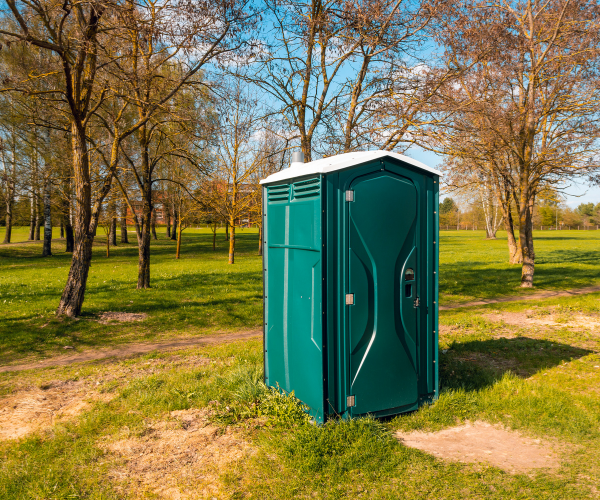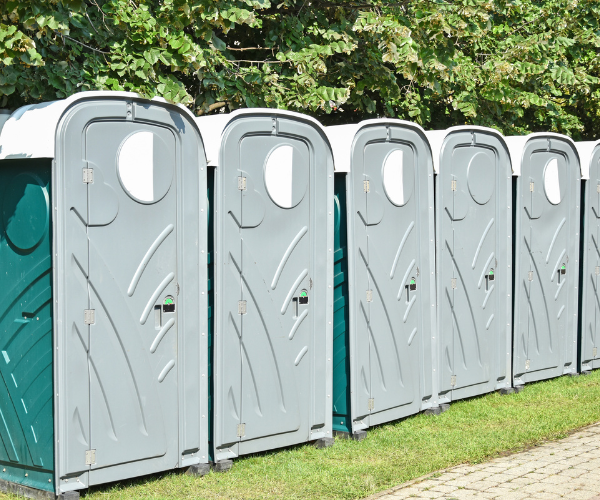The use of portable toilets presents a multitude of eco-friendly advantages. First and foremost, these units offer a significant reduction in water usage compared to traditional restroom facilities. Portable toilets utilize a closed waste system and often come with recirculating flush mechanisms, requiring minimal water per use, thus conserving valuable resources. Additionally, their transportability allows them to be strategically placed at events and worksites, reducing the need for constructing permanent, resource-intensive facilities. The materials used in portable toilets are often recyclable and durable, extending the lifespan of each unit while minimizing waste. Service providers also contribute to the environmental benefits by adopting sustainable waste treatment and disposal practices, ensuring minimal impact on the environment.Furthermore, portable toilets facilitate the containment and proper treatment of human waste, which is crucial in preventing soil and water contamination - a significant concern in remote or outdoor locations. By ensuring waste is managed responsibly, these units support public health and environmental conservation efforts. They also aid in maintaining cleaner, more hygienic surroundings, encouraging attendees of events to utilize them instead of nearby natural areas. In the context of sustainability, the introduction of chemical-free or biodegradable sanitization solutions in modern portable toilets further enhances their green credentials. Essentially, portable toilets provide a sound eco-friendly alternative to conventional bathrooms, illustrating the industry's commitment to sustainable practices while meeting the public's sanitation needs effectively.

Portable Toilet Rentals in Tazewell, Virginia
Call today for a free quote (276) 277-9235
Portable Toilet
Fast, Easy, & 100% Free To Get Started
Over 20 Years Experience
With over 20 years of experience, R&R Enterprises proudly serves Tazewell, delivering portable toilet services with uncompromising quality and deep community ties. Our family-owned business is committed to ensuring customer satisfaction through reliable and professional service.
Dedicated to Quality Service
R&R Enterprises provides top-grade portable toilet services, prioritizing quality and hygiene. Our experienced team ensures that every rental meets high standards, offering unmatched satisfaction and peace of mind for any event.
Responsive Quick Delivery
Our team guarantees efficient and timely delivery of portable toilets, ensuring prompt setup at your location. R&R Enterprises values your time, making your convenience our priority with swift service.
Convenient Portable Toilet Solutions in Tazewell
Call for a Free Quote Today
(276) 277-9235
At our company in Tazewell, Virginia, we aim to provide reliable, locally owned portable toilet services that you can depend on. Whether serving events at construction sites, hosting parties, accommodating festivals, or weddings, we ensure a seamless experience with quality units and exceptional service. Our trustworthy operations extend throughout Tazewell and its neighboring areas, delivering peace of mind with every rental choice. Dependability and customer satisfaction are our top priorities, ensuring that all portable sanitation needs are met with professionalism and care.


Our standard porta john rental units are durable and reliable for any commercial build site, housing development, public works project, or remodel job.Features include dome lighting, grated floors, and an “In-Use” locking mechanism for privacy and comfort. Regularly maintained, inspected, and cleaned by FusionSite at your location.

Developed as an alternative to full ADA-compliant restrooms, the Liberty is a spacious, wheelchair-accessible unit that can also be promoted as a family-sized restroom. Includes a patented flat-floor system for easy wheelchair access and maneuverability.Handrails, paper holder, and rotary latch are designed for simple, intuitive end-user operation.

Portable hand washing stations are essential for keeping your work site sanitary and clean. Features hands-free foot pumps, liquid soap, and paper towels.Perfect for job sites without water hookups, these units can handle hundreds of washes between services.
We Proudly Serve
Standard Portable Toilets
Standard Portable Toilets by R&R Enterprises offer clean, reliable sanitation solutions across Virginia for any occasion.
High Rise Portable Toilets
High Rise Portable Toilets in Tazewell provide efficient, elevated sanitation solutions tailored for high-occupancy buildings.
Restroom Trailers
R&R Enterprises' Restroom Trailers in Tazewell are the epitome of luxury, offering an elegant sanitation experience for upscale events.
Plumbing
Expert plumbing services in Tazewell by R&R Enterprises ensure your plumbing systems run smoothly and efficiently.
Septic Tank Cleaning
R&R Enterprises offers thorough septic tank cleaning across Virginia, ensuring effective waste management and system longevity.
Grease Trap Cleaning
In Tazewell, R&R Enterprises provides specialized grease trap cleaning, maintaining effective kitchen operations.
Fencing & Barricades
R&R Enterprises in Virginia delivers robust fencing and barricades for secure, well-organized events and construction sites.
Residential Storage
Offering reliable, secure residential storage solutions in Tazewell, R&R Enterprises caters to all your safety and space demands.
Tazewell Portable Toilets and More
Obtaining a quote and scheduling delivery for portable toilets in Tazewell has never been easier. Our straightforward process is designed to provide a seamless experience, allowing you to focus on your event. With several access points for requesting a quote, you can fill out forms readily available at both the top and bottom of our website pages. Click on any Get A Quote button throughout our site to begin. The simple form asks for basic information, such as your first and last names, phone number, and email. As soon as we receive your inquiry, our dedicated team will promptly address your needs, ensuring you have the information required to plan your event with confidence. From small gatherings to large events, our trusted service guarantees timely delivery and excellent customer satisfaction, so you can focus on what truly matters.

In the heart of Tazewell, where nature meets community, our portable toilet services provide the perfect blend of convenience and charm. Nestled near attractions like the Historic Crab Orchard Museum and annual events like the Tazewell County Fair, our facilities enhance outdoor experiences with reliable and clean sanitation solutions. Whether hosting a festival or celebrating a wedding outdoors, our user-friendly rentals cater to the needs of visitors and residents alike. We know the nuances of Tazewell and offer portable toilets that reflect the local spirit. Emphasizing accessibility and hygiene, our services are designed to meet high standards, ensuring that your event runs smoothly. From construction sites to community festivals, our versatile solutions are tailored to fit various occasions, making us the top choice in Tazewell for portable sanitation. Our commitment to quality and community involvement guarantees satisfaction and peace of mind, allowing you to focus on enjoying the event.
When it comes to portable sanitation services, our company sets the standard in Tazewell. Our local expertise and presence make us an indispensable ally for all your events. From weddings to large festivals, we offer impeccable service and top-quality units that cater to diverse needs. By choosing us, you gain access to not just portable toilets but to a dedicated partner committed to enhancing your event's success. Rely on our experience and community-driven approach to experience the reassurance of working with the best in the area.
Recognizing the importance of time, our portable toilet services swiftly and efficiently address your specific needs. Our dedicated team delivers fast, reliable service, preparing your event or worksite without delay. Focusing on rapid delivery and straightforward setup, our rental process remains seamless and stress-free, supported by a strong reputation for reliability and excellence. Rely on us for consistent quality and efficient service on each occasion.
Tazewell Portable Toilet Insights
Renting a portable toilet in Tazewell is a straightforward process designed to make your event planning hassle-free. To begin, visit our website where you'll find options to request a quote through forms located at both the top and bottom of the page. You may also click on any of the Get A Quote buttons available throughout the site for quick access. The form you need to complete requires your first name, last name, phone number, and email address, ensuring we have the necessary details to provide a prompt response. Once you've submitted the form, our team will contact you to discuss your specific needs and preferences, including the type of portable toilet suitable for your event or project. Whether you require a standard unit, a deluxe restroom trailer, or an accessible ADA unit, we're equipped to deliver solutions tailored to your requirements. We offer competitive pricing and flexible rental terms, alongside prompt delivery and collection services, to ensure seamless integration into your schedule. Our commitment to customer satisfaction means you'll be informed of every stage, from initial quote to final pick-up. With our extensive experience in Tazewell and access to a wide range of modern portable toilets, we guarantee excellent service and high-quality units. Trust us to provide the necessary sanitation infrastructure, allowing you to focus on what matters most - the success of your event.
The typical delivery timeframe for portable toilets may vary depending on the specific requirements of each client and the logistical considerations pertaining to their location. Generally, we aim to deliver portable toilets within 24 to 48 hours after the order is confirmed. Our priority is ensuring timely delivery to maximize convenience for our clients, whether planning an event or managing a construction project. Regular communication is maintained throughout the process, allowing us to address any urgent needs or schedule adjustments efficiently. Factors influencing the delivery timeframe include the proximity of the client's location to our service centers, the availability of the required portable toilet models, and any special installation or site preparation needs. For events with a larger setup, it's advisable to place orders well in advance to secure the appropriate units and confirm a delivery slot that aligns with event logistics. Our dedicated team is committed to facilitating seamless coordination, working collaboratively with clients to adjust timelines when possible and providing customized solutions that meet their unique requirements. We also offer emergency options for expedited delivery, accommodating unforeseen circumstances and ensuring that reducing any potential disruptions is prioritized for our clients' peace of mind. By choosing our services for portable toilet rental, clients in Tazewell can rest assured that they will receive reliable support, comprehensive planning assistance, and a flexible approach that addresses all their sanitation needs effectively and promptly.
Yes, we are fully equipped to service all types of events and construction services with our comprehensive range of sanitation solutions. Whether you're organizing a large festival, community sporting event, or elaborate wedding, we offer luxury restroom trailers and standard portable toilets that cater to diverse guest requirements. Our portable sanitation solutions extend beyond standard units, providing options like roll-off dumpsters, holding tanks, ADA-compliant units, and portable sinks with sanitizer stations for enhanced hygiene. We understand the varied demands of different event types and specialize in providing tailored solutions to meet your specific needs. Our team is adept at assisting in site planning, offering strategic advice to ensure optimal unit placement, and facilitating smooth traffic flow at larger events. Furthermore, our comprehensive offerings include fencing and barricades to manage crowds effectively, ensuring the safety and organization of your event space. In addition to event services, our portable sanitation options cater to construction sites, offering reliable units designed to withstand continuous onsite use. Our durable and efficient restrooms can handle high occupancy, supporting workforce operations with ease. Recognizing the importance of maintaining a clean and safe environment, we ensure regular maintenance and timely cleaning to keep all facilities in excellent condition. Ultimately, we are committed to providing personalized service that enhances your event or project, reflecting our dedication to quality, customer satisfaction, and environmental responsibility. Our extensive portfolio of services guarantees a suitable solution exists for every occasion, and our team is always ready to assist, ensuring a hassle-free, professional experience from start to finish.

